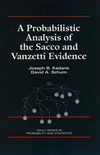Objętość 392 strony
A Probabilistic Analysis of the Sacco and Vanzetti Evidence
O książce
A Probabilistic Analysis of the Sacco and Vanzetti Evidence is a Bayesian analysis of the trial and post-trial evidence in the Sacco and Vanzetti case, based on subjectively determined probabilities and assumed relationships among evidential events. It applies the ideas of charting evidence and probabilistic assessment to this case, which is perhaps the ranking cause celebre in all of American legal history. Modern computation methods applied to inference networks are used to show how the inferential force of evidence in a complicated case can be graded. The authors employ probabilistic assessment to obtain opinions about how influential each group of evidential items is in reaching a conclusion about the defendants' innocence or guilt. A Probabilistic Analysis of the Sacco and Vanzetti Evidence holds particular interest for statisticians and probabilists in academia and legal consulting, as well as for the legal community, historians, and behavioral scientists. It combines structural and probabilistic ideas in the analysis of masses of evidence from every recognized logical species of evidence. Twenty-eight charts show the chains of reasoning in defense of the relevance of evidentiary matters and a listing of trial witnesses who provided the evidence. References include nearly 300 items drawn from the fields of probability theory, history, law, artificial intelligence, psychology, literature, and other areas.










